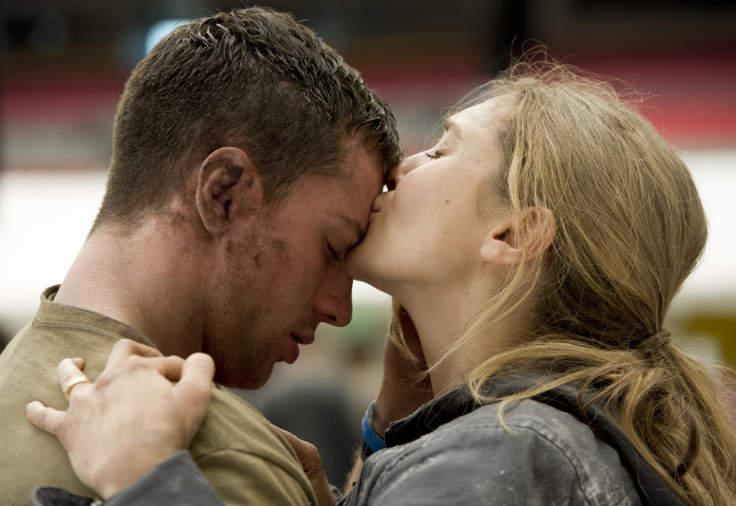
“Godzilla was born out of fear.”
That’s according to actor Ken Watanabe, a man who did not necessarily grow up watching Godzilla in his native Japan but was well aware of the social impact the original 1954 film had on his country.
Nearly 10 years after the bombing of Hiroshima, “Godzilla” showed the terrors of nuclear power and that this energy is something to be feared. Fear is a very human emotion, and director Gareth Edwards looked to bring an array of emotion and humanity to his 2014 “Godzilla” film -- with great results.
“I didn’t quite understand what Godzilla meant in the original Japanese movie. He [Gareth] told me that he wanted this rooted family and the point was to get them back together at the end,” Elizabeth Olsen said about first being approached about the movie. “But they [Gareth/Legendary] haven’t quite figured it out.”
Olsen plays Elle Brody, the wife of Ford Brody but also a city nurse in California. Her connection to Ford -- Aaron Taylor-Johnson -- is the linchpin to all of the emotional weight of the film.
“Godzilla” is a very ambitious project that Legendary Pictures decided to take on, especially considering how the last American version of the reptilian behemoth turned fans and critics against it. The 1998 film was textbook on how neglecting human elements can turn a movie into something lifeless and vacuous.
The stigma that came with the Godzilla movie -- especially an American produced film -- and name would carry over for years. So it was very important for the creators to get their everyone on board with their vision.
“Why would they make another ‘Godzilla’ movie? I should stay away from that.” Aaron Taylor-Johnson, revealed when the script was first given to him.
Taylor-Johnson was pegged to play the lead role in this film, so it was important to have him share the studio’s enthusiasm. Gareth’s name was a definite draw for Taylor-Johnson, as was the director’s willingness to sit down with his stars and scrupulously go through the scripts with them.
“When I sat down with Gareth and he told me it was about two characters that come together through these massive events in the movie he had me.”
The spotlight on the humans and what they go through in the midst of towering monsters fighting each other became a sticking point to get Taylor-Johnson, Olsen and Watanabe to agree this is the movie that needs to be made.
“Aaron [Taylor-Johnson] and I were signed on and we talked to Gareth through different drafts and it became exactly what they wanted it to be all along, which is quite phenomenal [Laughs].” Olsen said of the process of understanding the film.
“His [Gareth’s] whole heart and soul is in [the movie]. This whole emotional journey in the midst of catastrophe,” Taylor-Johnson said. “He told me everything he wanted to do and looking at it now, nothing has changed.”
And that faith will hopefully be rewarded at the box office as Legendary Pictures trusted Edwards to helm such a big project. And while Toho and Japan has supported the film, it’s only fitting that Edwards and the crew give some nods to how the Japanese approached it. In the 1954 movie, nuclear energy was an encompassing theme and with the 2014 version the balance of nature and how man has treated the world is addressed.
“Even after 60 years people are still fascinated by Godzilla, why?” Watanabe asked rhetorically. “Nuclear power and energy is still feared.”
Watanabe plays Dr. Serizawa, a scientists who specializes in nuclear energy when he uncovers the existence of Godzilla.
“After his father survived Hiroshima in 1945, because of that background, he studied nuclear power for something meaningful for mankind,” Watanabe says. “He discovers Godzilla’s existence where he realizes the power of nature.”
It’s Serizawa who throughout the movie urges the army -- and mankind -- to let nature take its course to defeat the MUTO, an ancient breed of insect-like creatures that feed off of nuclear energy. He is correct of course as Godzilla arrives to put nature back in balance.
However, Watanabe asks the audience to consider something when it comes to Godzilla being the ‘hero’ of the story. Does Godzilla roar in triumph? Or is it something else?
“There’s a scream of sadness. His scream is scolding us [mankind] for our foolishness.”
It’s this look that has the 2014 ‘Godzilla’ film anything but a monster mashup. It does not hammer any particular message or agenda into the audience's’ head, but it does a great job of bringing up some good points. And as Aaron told the press, “a lot of that [the message] got condensed but the undertones are there.”
And that’s why the 2014 ‘Godzilla’ film will resonate with all audiences.
“I wasn’t a big Godzilla person, this was an unusual idea. People my age didn’t see the Matthew Broderick film, so what I learned from Godzilla is how funny dubbing can be.” Olsen said. “This is my first experience where there sci-fi/monster films are supposed to have these young kids can go see it and say ‘wow that’s cool’ and then everyone else can go see the hints of making a larger point and a larger story. And that’s why I feel this film is successful.”
© 2025 Latin Times. All rights reserved. Do not reproduce without permission.





